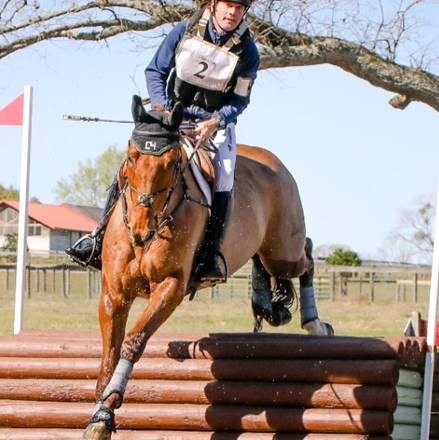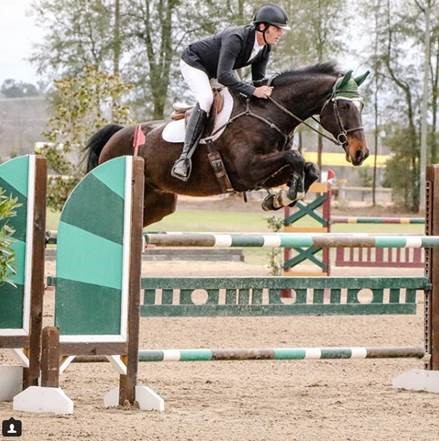Q&A with Team SmartPak: Ryan Wood’s Tips for Traveling and Showing
Ryan Wood, a native of Australia, has built the successful business of Woodstock Eventing, which is based out of Unionville, Pennsylvania. As a rider, Ryan has competed at some of the country’s top shows, including the 4* Kentucky Three-Day Event, and has earned himself an extensive list of career highlights since coming to the United States in 2008. On top of his successful sales program and riding career, Ryan also spends his time training riders and teaching at clinics.

Photo Credit: Cindy Lawler
To compete at some of the best events can mean traveling across the country and, in some cases, around the world. So, what does it take to travel to a competition and keep your horse performing at their best? We asked Ryan, who is responsible for the care of his top equine athletes, to share his top tips for riders looking to travel to shows with their horses.
What is your advice for a rider who is looking to travel long distance with their horse?
“When it comes to traveling, the biggest thing that comes into play is making sure you’ve planned everything out. You want to make sure there is the least amount of stress as possible on the horse. As an example, we are bringing Woodstock Bennett to Tattersalls 3* International Horse Trials in Ireland. When planning this trip, we want to make sure that we take the most direct way to the event. Our plan is to trailer from Pennsylvania to Chicago, in which our horses will take a direct flight into Dublin. Going home from this event, we’ll plan to take the longer route, and while that means we might pay a little more, it will make travel on the horse easier. It takes a lot of coordination and planning on the back end as well to make these flights happen.”
As you mentioned, you’re going to be traveling across the world to compete some of your horses, but regardless of whether it’s national or international travel, what are some of your pre-trip routines?
“I want to make sure the horses are as comfortable and healthy as possible when they travel. We want to do whatever we can to reduce the risk of the horse having health issues related to traveling. One of the more common things is the horse can get shipping fever, which can take three to five days to clear up. When you’re preparing for a competition, you just don’t have that extra time to give them a chance to recover.
I like to use SmartPak’s SmartLytes – all of the horses have them in their SmartPaks, and I also like to use the paste formula a few days out before they travel to help ensure they’re getting the electrolytes they need and to encourage normal drinking.”
Do you pre-plan your show schedule based on the amount of travel? Does this impact your horse selection for competition?
“We do a lot of traveling throughout the year. All of the horses are sent south for the winter and come back up in the spring, so they are used to traveling long distances. When planning our competitions for the year, we like to pick the major events first (like Tattersalls) and work backwards on the remainder of the year from there. We have a plan when we go to other competitions that are going to best prepare us for the bigger events. We don’t want to do a big event as our last event before traveling abroad, because it takes a lot out of the horse. So instead, we try and do something more local.”
What is something you and your horse(s) never travel without?
“I always send my horses on a trailer (or on the plane) with their SmartPak Shipping Halter. This is big for me because it offers some protection – when the horses are on the trailer and nipping at each other or trying to get to their hay nets, they end up with cuts and marks on their face. This halter just adds a little extra protection to give us peace of mind.”

Photo Credit: Cindy Lawler
How do you help your horses adjust to new locations when it comes to atmosphere, feeding, etc.? What are some tips for helping your horse settle when they reach a new location?
“Obviously with travel, the day-to-day routine and overall environment will be different. The housing is also a factor that will change and will need to be taken into consideration to make the appropriate adjustments. There is limited to no turnout at events, so if the horses are used to being turned out, we need to make sure they get out of their stalls.
We like to hand graze as much as possible throughout the day because I always find that the horses settle best when they are grazing. This not only gets them out of their stall, but it gets them walking around and gets their head down and stretching. It’s good for them to get their heads down, especially if they have been standing in a trailer or flying for long periods of time, because it helps drain whatever mucus might have been building up. If we have multiple horses at an event, we’ll try and take them out with a familiar buddy or another person, which helps them feel more at ease.
When it comes to feeding, we always bring their same grain with them. For local and national shows, we typically do bring our own hay. However, when we go overseas, we try and find a hay forage source local to the event.”